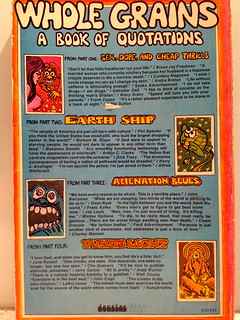Don’t just read the easy stuff. You may be entertained by it, but you will never grow from it.
~ Jim Rohn
This was a quotation someone tweeted the other day.
I never quite know what I think of quotations. I see lots of them on Twitter, and I write many down, sometimes even ones I vehemently disagree with.
I don’t know why I write them down, exactly. They’re pithy, I suppose, but then, even when I agree with them at face value, they can evoke a sense of self-righteousness, even smugness, in me, which I don’t quite like. Definitely a form of entertainment, maybe instant gratification. At best, if the quotation is some sort of encouragement or enticement to Do Things Differently, it makes me think about my own approach. Is there a better way? Of course this sort of thought is fleeting and it’s rare that reading a quote makes me A Better Person.
Not only do they not help me improve, but I think quotations are often taken out of context, and they so easily become clichés, or are misquoted. Instead of reading the whole play, poem, speech, book, from which the quotes are taken, they let you take shortcuts. You can sound erudite if you can quote something (or someone) and do so at an apt moment; I seldom manage to do this, I used to wish I could. Isn’t it natural to want a shortcut? “Just add water”?
Maybe a quotation would be more useful if, when using it, people would also cite the title of the work it comes from. In most cases it’s easy enough to find out who the speaker/writer was (I looked up Jim Rohn, above, for instance), but it can sometimes be challenging to work out where the quotation was taken from.
A good example of a quotation which is widely used:
The illiterate of the 21st century will not be those who cannot read and write, but those who cannot learn, unlearn, and relearn.
~ Alvin Toffler
I’ve tried to find out when or where Alvin Toffler said this, with no luck. (Did he even say it? If you know, I’d love it if you shared the information with me.)

If I consult a traditional dictionary of quotations, this sort of work will almost always tell me where the quotation originated. The Macquarie Dictionary of Australian Quotations (1990) further reminds me that “a quoteworthy quotation is much more than just anything bounded by inverted commas. Normally it will be a brief statement, usually one sentence, which encapsulates a significant idea in a significant manner.” It goes on to state that “Sometimes a quotation may not be philosophically complex or rhetorically interesting in itself, yet be significant because of the identity of the speaker and the importance of the situation in which it was spoken.”
Perhaps it’s the speed and sheer volume of things being published daily on the Web, but I often see things misquoted or lacking a complete citation. It’s easy to parrot someone else’s profundity. It’s also easy enough to link to a speech, article, chapter, or paper, when quoting someone. Yes, firewalls get in the way, but linking is easy and we ought to give credit where credit is due.
So yes, I agree, don’t just read the easy stuff, don’t just look at the snappy quotations. For me the additional lesson is to follow up, and to not avoid the long reads. To read more deeply and critically.
NOTES:
1. Image is the back cover of a very amusing book in my collection: Whole Grains: A Book of Quotations edited by Art Spiegelman and Bob Schneider.
2. For this last post of #blogjune, I started writing with absolutely no idea how it was going to end. Picked a quotation to respond to.
3 Comments
I like the little quotations on old-fashioned desk calendars – inevitably disappointing so it’s a nice surprise when they’re logical or could even apply to something in real life.
Have you seen the quotation resources on the National Library’s eresources? Annoyingly my favourite is only available in the building onsite because of the licence. http://www.nla.gov.au/app/eresources/search/quotations/
Congratulations on the last day of blogjune and thanks for coordinating everyone!
I’m finding this to be a real problem with readings for weddings. Hardly any of them come with more than the author’s name, and about half of them aren’t actually attributed to the right author. Lots seems to be made up of quotes from several people, put together by someone unknown for their wedding, then copied a few times across the Internet, losing whatever context they once had. It’s quite frustrating for our over-trained academic referencing reflexes – how do you put those in the reference list at the back of the programme? (So far, we don’t, we go find a “real” quote :p)